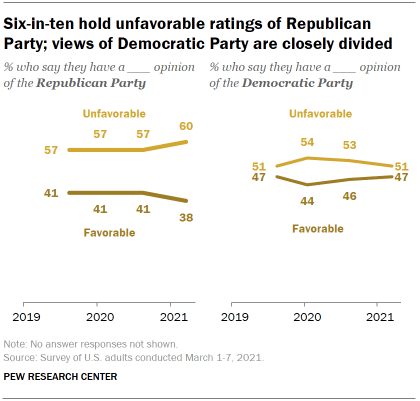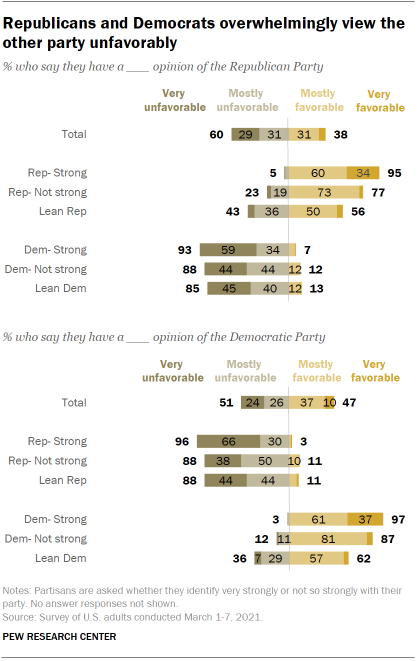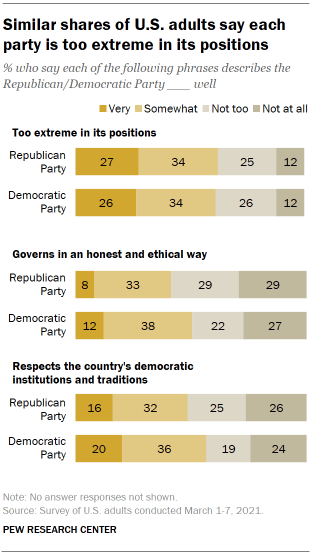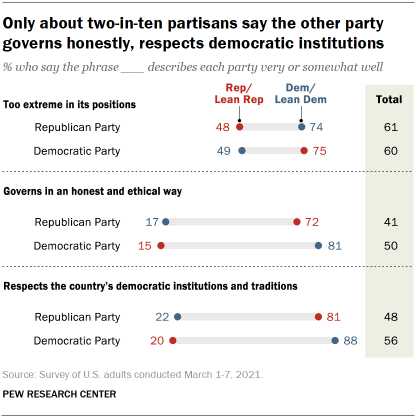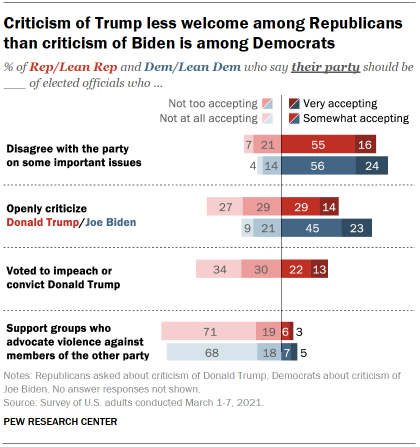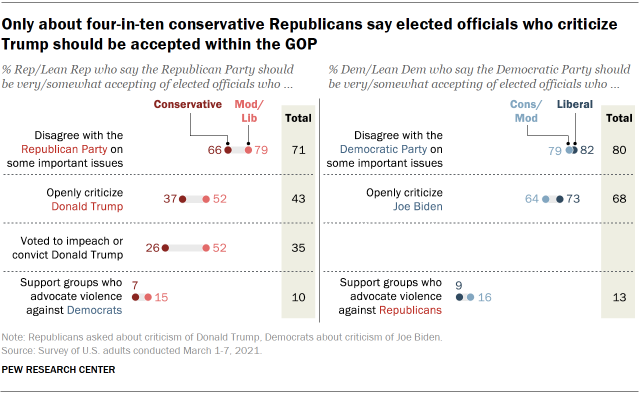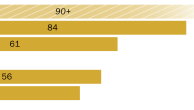Just under half of Americans (47%) have a favorable view of the Democratic Party, while a slightly larger share (51%) have an unfavorable view.
The GOP is viewed more negatively – 38% say they have a positive view of the Republican Party, while 60% rate it unfavorably. These views are modestly changed since last summer, with the share of Americans rating the GOP unfavorably slightly higher than it was in August (57% then, 60% now) and the share of Americans with a negative view of the Democratic Party down slightly (53% unfavorable then, 51% now).
About three-quarters of Republicans and Republican-leaning independents (74%) view the GOP favorably, while 81% of Democrats and Democratic-leaning independents view the Democratic Party positively.
Nearly all Republicans who say they strongly identify with the Republican Party (95%) express a favorable opinion of the GOP. Among Republicans who say they “not so strongly” identify with the party, 77% say have a favorable view, while 56% of independents who lean toward the Republican Party say the same.
Democrats who “very strongly” identify with the Democratic Party (97%) nearly universally view their party favorably, as do 87% of Democrats who describe themselves as not-so-strong Democrats. About six-in-ten Democratic leaners (62%) have a favorable opinion of the Democratic Party.
Within both partisan groups, views of the opposing party are overwhelmingly unfavorable across-the-board, with more than eight-in-ten – strong partisans, not so strong partisans and leaners alike – saying this.
However, strong partisans are more likely than weaker partisans and leaners to express very unfavorable views of the opposing party: 59% of strong Democrats say this of the GOP, while 44% of not-so-strong partisans and 45% of leaners say the same. Similarly, 66% of strong Republicans have a very unfavorable view of the Democratic Party, while far smaller shares of not-so-strong Republicans (38%) and GOP leaners (44%) say the same.
About six-in-ten Americans view both the Republican and Democratic parties as taking positions that are too extreme, while the Democratic Party holds advantages with the public when it comes to governing honestly and ethically and respecting the country’s democratic institutions.
About six-in-ten (61%) say the phrase “too extreme in its positions” describes the Republican Party very or somewhat well, with an almost identical share (60%) saying the same about the Democratic Party. About a quarter say this phrase describes each party very well (27% for the Republican Party, 26% for the Democratic Party).
Half of adults say the phrase “governs in an honest and ethical way” describes the Democratic Party very or somewhat well, compared with about four-in-ten (41%) who say it describes the Republican Party. And while 56% say the phrase “respects the country’s democratic institutions and traditions” describes the Democratic Party very or somewhat well, 48% say this about the GOP.
Three-quarters of Republicans and Republican leaners say “too extreme in its positions” describes the Democratic Party at least somewhat well, while about the same share of Democrats (74%) say this phrase applies to the GOP. About half of those in each partisan group say the phrase applies at least somewhat well to their own party.
Views on whether each party governs honestly and respects democracy are even more sharply divided. More than seven-in-ten Republicans (72%) and about eight-in-ten Democrats (81%) say the phrase “governs in an honest and ethical way” describes their own party very or somewhat well. But just 15% of Republicans and 17% of Democrats say this describes the other party very or somewhat well.
About eight-in-ten Republicans (81%) and 88% of Democrats say the phrase “respects the country’s democratic institutions and traditions” describes their own party very or somewhat well, while about two-in-ten say this about the other party.
Most Republicans say critics of Trump should not be accepted in the GOP, while most Democrats say their party should be accepting of Biden critics
Large majorities of both Republicans and Democrats say their party should be accepting of elected officials within the party who disagree with it on some important issues. At the same time, very few in either party say their party should be welcoming of elected officials who support groups advocating for violence against members of the other party.
But there are clear distinctions between the two coalitions in their appetite for accepting members of the party who criticize the party’s standard bearers: While most Democrats say the party should be at least somewhat accepting of elected officials who criticize Joe Biden, the majority position among Republicans is that the GOP should not be welcoming toward Republican elected officials who criticize Donald Trump, and an even smaller share of Republicans say that those who voted to impeach Trump should be accepted in the GOP.
Eight-in-ten Democrats and Democratic leaners say the Democratic Party should be very (24%) or somewhat (56%) accepting of Democratic elected officials who disagree with Democrats on important issues, while 71% of Republicans and Republican leaners say their own party should be very (16%) or somewhat (55%) accepting of Republican officials who disagree with the GOP on some important issues. Just 4% of Democrats and 7% of Republicans say their parties should be not at all accepting of elected officials who disagree with the party on some important issues.
About nine-in-ten Republicans (89%) and Democrats (86%) say their parties should be not too or not at all accepting of elected officials who support groups which advocate violence against members of the other party, including roughly seven-in-ten who say this should not be accepted at all. Just 10% of Republicans and 13% of Democrats say their parties should be very or somewhat accepting of elected officials who support this type of group.
About two-thirds of Democrats (68%) say the Democratic Party should be very (23%) or somewhat (45%) accepting of elected Democrats who criticize Biden. Only about one-in-ten (9%) say their party should be not at all accepting of elected officials who do this.
In contrast, just 43% of Republicans say the GOP should be very (14%) or somewhat (29%) accepting of critics of Trump within its ranks. More than half of Republicans (56%) say the Republican Party should be not too (29%) or not at all (27%) accepting of officials who criticize Trump.
Acceptance of Republican elected officials who voted to impeach or convict Trump is even lower among rank-and-file Republicans and Republican leaners: Only about a third (35%) say the party should be at least somewhat accepting of those who did this.
Just 37% of conservative Republicans say the Republican Party should be accepting of officials who criticize Trump, compared with about half (52%) of moderate and liberal Republicans. Conservative Republicans are even less accepting of elected Republicans who voted to impeach or convict Donald Trump: 26% say the party should be very or somewhat accepting of those who did this, while 52% of moderate and liberal Republicans say these officials should be accepted in the party.
While clear majorities of both liberal Democrats and conservative and moderate Democrats say the party should be accepting of criticism of Joe Biden in its ranks, there is a modest ideological gap in these views: 73% of liberal Democrats say the party should be very or somewhat accepting of elected Democrats who criticize Biden, compared with a smaller majority (64%) of moderate and conservative Democrats.
CORRECTION (Apr. 26, 2021): The title of this chart was updated to reflect the correct percentage of conservative Republicans who say elected officials who “openly criticize Donald Trump” should be accepted within the GOP. The updated title should read: “Only about four-in-ten conservative Republicans say elected officials who criticize Trump should be accepted within the GOP.”
The changes did not affect the report’s substantive findings.
